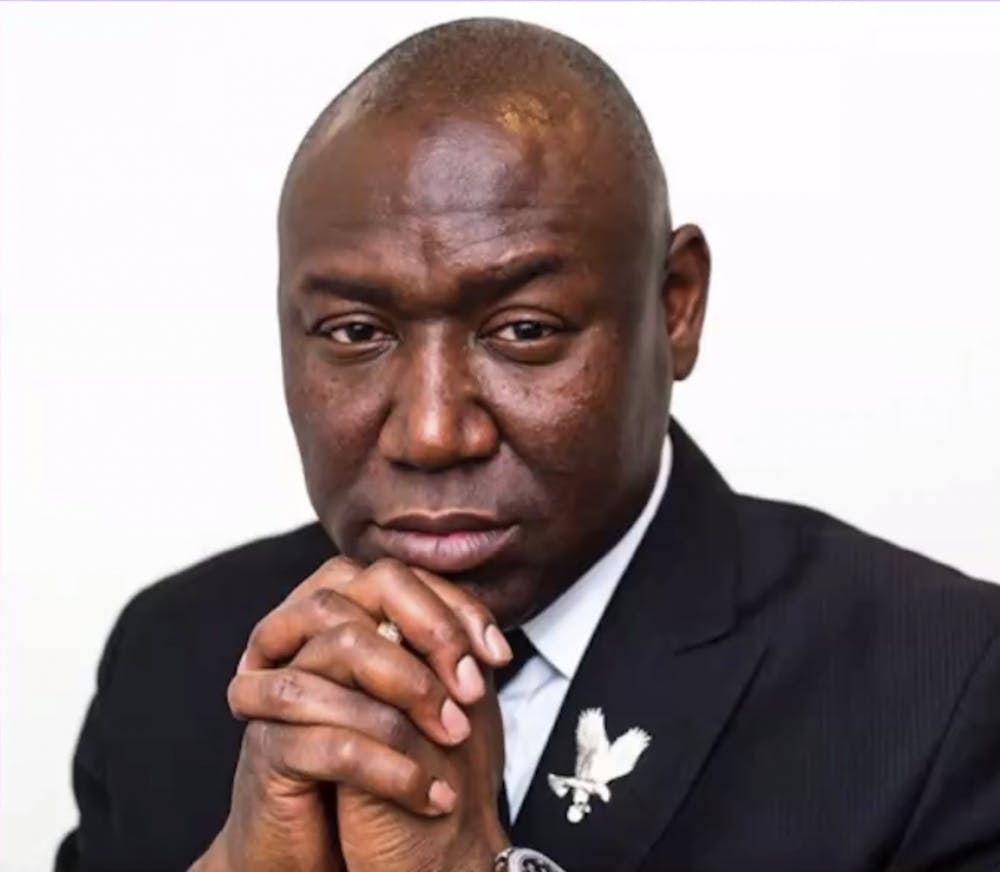On the evening of Oct. 27, renowned civil rights attorney Benjamin Crump delivered a virtual lecture hosted by the Brown Lecture Board to 120 online attendees. Wearing a suit adorned with a deep purple tie and silver eagle lapel pin, Crump explained that he had just left Marcellis Stinnette’s vigil.
Stinnette, a 19-year-old Black man from Waukegan, Illinois, was fatally wounded by police when an officer shot him and his 20-year-old girlfriend in his car last week.
Crump, known as “Black America’s Attorney General,” is the go-to lawyer for families who have lost a loved one to police violence. Among them are the families of George Floyd, Breonna Taylor and Ahmaud Arbery. During the online discussion moderated by Director of the Center for the Study of Race and Ethnicity in America and Professor of Africana Studies Tricia Rose MA’87 PhD’93, Crump addressed police brutality, systemic racism and current avenues for change.
In the first half of the event, Crump spoke about the tragic deaths of Black people at the hands of police: Stinnette, a young man who was in the car with the mother of his seven-month-old baby; Jacob Blake, who was shot seven times in the back in front of his three young sons; and Floyd, who was filmed saying “I can’t breathe” at least 28 times by a 17-year-old girl. And the list, he said, goes on.
“We can make a better America. One where George Floyd gets an opportunity to take a breath. Where Breonna Taylor gets an opportunity to sleep in peace. Where Ahmaud Arbery gets an opportunity to run free and all of our children have an equal opportunity at their American dream,” Crump said. “We have to take advantage of this moment to help get systemic reform to change the behavior and the culture of policing in America.”
Crump has had a long career as a civil rights lawyer and has won over 200 civil cases related to police violence, one of them being the case of Trayvon Martin, a 17 year old who was fatally shot by George Zimmerman, a neighborhood watch volunteer, eight years ago. Crump and his team offer free consultations and charge a one-third fee on the settlement if they win, and nothing if they don’t.
“We knew that we had a platform that we could (use to) promote a conversation about racial justice, so that was our priority this semester,” said Megan Yeager ’22, president of the Brown Lecture Board.
On Tuesday night, Crump repeated the phrase “we have to speak truth to power” and emphasized the need to use intellectual, communication and diplomacy skills to mobilize, be politically active and create a better future. He cited the need to abolish policies disproportionately used against minorities, particularly Black men, like the no-knock warrant that preceded the shooting of Taylor and the chokehold that was used on Eric Garner and Floyd.
When asked about systemic change, Crump called for accountability for police officers. He spoke about the need for empathy and for a change to the criminal justice system and the school-to-prison pipeline.
“If this trend continues, in the next 25 years, one out of every three Black men in America will be a convicted felon,” relegating them to a permanent second-class status, Crump said.
Crump said that each of the widely discussed models of reform — partial defunding of police or complete abolition of police — has credibility and shortcomings. The model of change, he said, is less essential than the overall strategies for fighting systemic racism, which manifests itself in mass incarceration and police brutality. Some ideas include reallocating resources or creating community partnerships.
“We need to have our religious partners, business partners, our educational partners, our social work partners, our law enforcement partners, our university partners all come together and talk about solutions and talk about how we (can) sit down and do the hard work with our city council,” Crump said.
Near the end of the discussion, Crump left the audience on a hopeful note. In his first year at law school, his professors taught him that their work should be based on precedent so as to maintain consistency in the law. Initially, Crump rejected this idea because “if we just accept the precedents, then I as a Black American would still be a slave.”
However, he continued: “Based on precedents, we overcame the Middle Passage. Based on precedents, we overcame being defined as three-fifths of a human being. … Based on precedents, we overcame Jim Crow efforts. … So I say no matter who they appoint to the Supreme Court or elect president, based on precedents, Black people will overcome whatever they try to throw at us.”
In addition to the live virtual discussion, the Brown Lecture Board will, for the first time, offer a recording of the lecture on its website for the following month, allowing for greater accessibility to the event and its content.
Correction: A previous version of this story stated that Trayvon Martin was fatally shot by a police officer eight years ago. In fact, Trayvon Martin was fatally shot by George Zimmerman, a neighborhood watch volunteer. The Herald regrets the error.

ADVERTISEMENT




